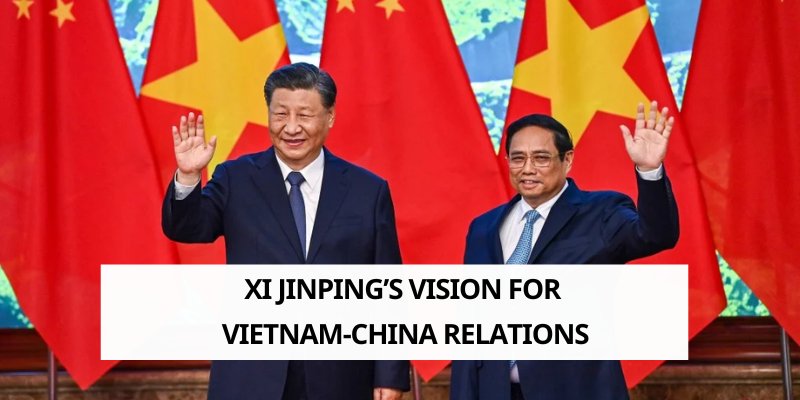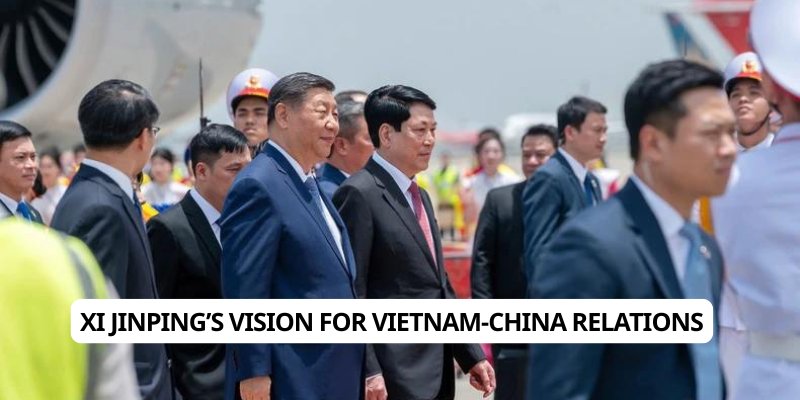As the world navigates a landscape of economic uncertainty and geopolitical flux, the relationship between Vietnam and China stands as a beacon of shared ideology and mutual ambition. On the eve of his state visit to Hanoi on April 14, 2025, Chinese General Secretary and President Xi Jinping penned a compelling message in Vietnam’s Nhan Dan newspaper, articulating a vision for deepened ties between the two socialist neighbors.
In his words, the visit represents an opportunity to “inherit the past and write a new page for the future.” With a packed agenda that includes high-level talks with Vietnam’s top leaders, Xi’s visit underscores the strategic importance of this partnership in shaping a stable and prosperous regional order.
A Foundation of Shared Ideals
Xi’s message begins with a reaffirmation of the unique bond between China and Vietnam, rooted in their shared commitment to socialism. As neighboring nations with aligned political beliefs, the two countries have cultivated a relationship built on trust and mutual respect. This ideological synergy, Xi argues, is not merely historical but a living framework for addressing contemporary challenges. In an era marked by global volatility, the partnership offers a model of stability, grounded in a common vision for development and governance.
The Chinese leader’s emphasis on shared ideals is timely. Both nations face the complexities of balancing economic growth with social equity, all while navigating external pressures. By framing the relationship as one of “comrades and brothers,” Xi invokes a sense of camaraderie that transcends borders, positioning Vietnam and China as partners in a shared journey toward modernization. This narrative sets the tone for a visit aimed at reinforcing bilateral ties and charting a path forward.

Navigating a Turbulent Global Economy
Central to Xi’s message is a call for enhanced coordination in the face of global economic headwinds. The world, he notes, is grappling with the fallout of trade wars, protectionism, and supply chain disruptions. “Trade wars and tariffs have no winners,” Xi asserts, “and protectionism offers no way out.” His words reflect a deep concern for the erosion of multilateralism, which has long underpinned global prosperity. For Vietnam and China—two economies deeply integrated into global trade networks—the stakes are high.
Xi advocates for a united front to safeguard the multilateral trading system and ensure the stability of global production and supply chains. This is not an abstract plea but a pragmatic strategy. China, as the world’s second-largest economy, and Vietnam, a rising manufacturing hub, have a vested interest in maintaining open markets and fostering cooperation. By aligning their efforts, the two nations can mitigate the risks posed by external shocks, from rising tariffs to geopolitical rivalries. Xi’s vision is clear: an open and cooperative international environment benefits all, and Vietnam and China must lead by example.
A Packed Diplomatic Agenda
The visit itself is a testament to the depth of this partnership. Over the course of two days, Xi is scheduled to engage in high-level talks with Vietnam’s leadership, including General Secretary To Lam, President Luong Cuong, Prime Minister Pham Minh Chinh, and National Assembly Chairman Tran Thanh Man. These discussions are expected to cover a broad spectrum of issues, from trade and investment to regional security and cultural exchange. The meetings signal a commitment to elevating bilateral relations to new heights, building on decades of diplomatic engagement.
Xi’s itinerary reflects the multifaceted nature of Vietnam-China ties. Economic cooperation, a cornerstone of the relationship, will likely dominate the talks, with both sides keen to expand trade and infrastructure projects under initiatives like the Belt and Road. Security and maritime issues, particularly in the South China Sea, may also feature, as both nations seek to manage tensions and promote stability. Cultural and people-to-people exchanges, which Xi has championed in past visits, will further strengthen the bonds between the two societies.

Writing a New Chapter
Xi’s closing remarks in Nhan Dan are both aspirational and resolute. He calls for Vietnam and China to “join hands” in writing a new chapter in their relationship, one that honors their shared history while embracing future opportunities. This vision is not without challenges. Differences in priorities, historical sensitivities, and external pressures will test the partnership. Yet, Xi’s message is one of optimism, grounded in the belief that cooperation can overcome obstacles.
The Chinese leader’s emphasis on “inheriting the past” is particularly poignant. The Vietnam-China relationship has weathered storms, from historical conflicts to ideological divergences. Today, both nations stand at a crossroads, with the potential to shape the regional and global order. By leveraging their complementary strengths—China’s industrial might and Vietnam’s dynamic economy—they can forge a partnership that is greater than the sum of its parts.
Implications for the Region and Beyond
Xi’s visit and message carry implications far beyond bilateral ties. In a region marked by competing interests, from U.S.-China rivalry to ASEAN’s balancing act, the Vietnam-China partnership offers a counterpoint to zero-sum geopolitics. By prioritizing cooperation over confrontation, the two nations can anchor Southeast Asia’s stability, fostering an environment conducive to growth and development. Their commitment to multilateralism also sends a signal to the world: in an age of division, collaboration remains the path to prosperity.
For Vietnam, the visit is an opportunity to deepen ties with its largest trading partner while asserting its own agency. Hanoi’s pragmatic approach—balancing relations with China, the U.S., and other powers—reflects its strategic acumen. For China, the visit reinforces its role as a regional leader, capable of building alliances based on mutual benefit rather than coercion.
Xi Jinping’s visit to Vietnam on April 14, 2025, is more than a diplomatic formality; it is a defining moment for one of Asia’s most consequential relationships. His message in Nhan Dan sets the stage for a partnership that is both rooted in history and forward-looking.
By calling for unity against global challenges and pledging to write a new chapter together, Xi has laid out a roadmap for Vietnam and China to navigate an uncertain world. As the two nations engage in high-level talks, the world will be watching, eager to see how this socialist alliance shapes the future of the region and beyond.

